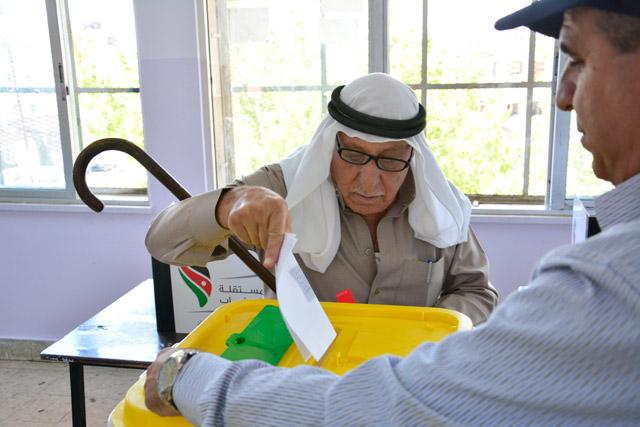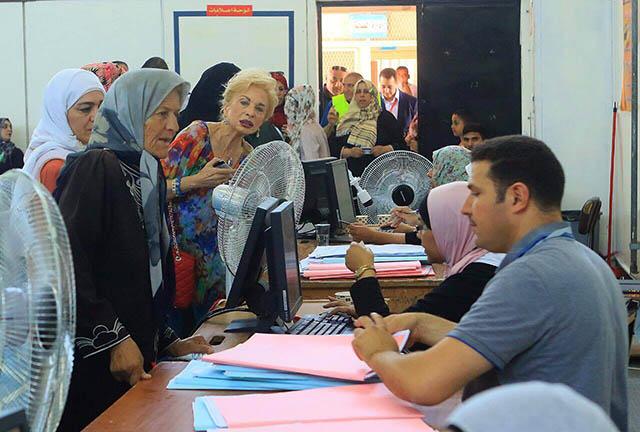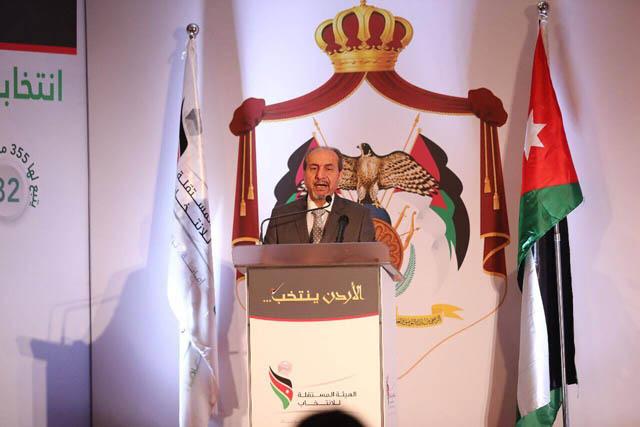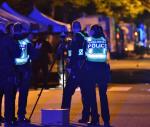You are here
Jordanians elect municipal officials, governorate council members
By Dana Al Emam - Aug 16,2017 - Last updated at Aug 16,2017

A man casts his ballot at a polling station in Amman on Tuesday (Photo by Amjad Ghsoun)
AMMAN — Voting for the decentralisation and municipal elections concluded late Tuesday night with a 31.7 per cent voter turnout rate of some 4.1 million eligible voters, the Independent Election Commission (IEC) announced.
The highest voter turnout was registered in Ajloun at 60 per cent, while the lowest was in Zarqa city with only 15 per cent of eligible voters having cast ballots.
The results were tentative, said IEC President Khaled Kalaldeh at a press conference, as voters were still casting ballots in the areas where the voting period was extended in Amman and Zarqa. Voters who enter the polling stations before the deadline are allowed to cast ballots regardless of the time needed to complete the process.
The vote counting process was ongoing by the time this story went to print, and initial results are expected today.
Towards the end of the voting, the turnout rate was 50 per cent in Maan, 28.5 per cent in Irbid city, 58.5 per cent in Karak and 50 per cent in Tafileh.
“These voter turnout rates are good, and there is no specific threshold to indicate the success of the electoral process,” the commission’s Spokesperson Jihad Momani told reporters.
The IEC’s council of commissioners had decided to extend the voting deadline in all voting stations located in the Greater Amman Municipality for two hours to close at 9:00pm.
Voting was also extended for one hour in Irbid Central District and for two hours in Zarqa Central District to encourage eligible voters to participate in the polls.
The other voting stations across the Kingdom closed at 7:00pm, without any extensions.
The electoral process was mostly trouble-free, except for violations at the Central Badia District.
Ballot box number 21 in Muwaqqar District was violated when stamped ballot papers were added to the box.
Three other ballot boxes were broken, and a computer in one of the three voting stations was damaged, Momani announced earlier on Tuesday.
Later in the evening, The IEC announced that the Muwaqqar elections were cancelled.
Also, ballot box number four in Queen Rania Al Abdullah School was destroyed, and a head of an electoral committee in Um Butma was held captive by anonymous individuals.
The electoral process witnessed a number of additional violations that the IEC described as “minor”.
Security authorities have detained two suspects for circulating photos of ballot papers taken from the voting booth via social media outlets.
It is illegal for voters, accredited journalists and observers, as well as those working on facilitating the electoral process to violate the secrecy of voting, said IEC’s Momani, adding that the commission was investigating the matter.
In Tuesday’s elections, Jordanians elected mayors, members of municipal councils as well as the governorate councils, which were elected for the first time under the Decentralisation Law.
Elected members of the governorate councils will replace assigned consultative councils for local executive councils, in a bid to enhance the oversight role of citizens and public participation in decision making as developmental planning and allocation of funds will be vested in the new councils.
Article 6 of the law stipulates that the Cabinet will appoint as members of the governorate council, upon a recommendation by the interior minister, no more than 15 per cent of the number of elected members, provided that
one-third of this percentage is allocated to women, who also enjoy a 10 per cent quota of the elected members.
Prime Minister Hani Mulki on Tuesday expressed his appreciation for all state institutions, especially the IEC for its efforts to guarantee the integrity of elections.
In remarks to journalists following casting his ballot, Mulki said that these elections form a “historic step” towards the comprehensive reform in Jordan, the Jordan News Agency, Petra, reported.
In a morning session held at the IEC’s media centre, Minister of State for Media Affairs and Government Spokesperson Mohammad Momani underlined Jordan’s “persistence” in carrying on with its comprehensive reform project, which includes conducting the local twin elections on time (see story page 3).
Election watchdogs were in general satisfied with the way the polls were conducted.
The National Centre for Human Rights Commissioner General Mousa Burayzat described the electoral process as mostly smooth and “close to integrity standards”
(see story on page 4).
The Centre for Defending the Freedom of Journalists said in a statement that 25 cases involving harassment of journalists covering the polls were recorded.
Despite the significance of their participation as candidates in the municipal councils and governorate councils, Jordanian women showed up in “weak” numbers to vote in Tuesday’s elections, according to official figures (see story on page 3).
While women make up around 53 per cent of the 4.1 million citizens eligible to cast their votes in the local twin elections, only a small percentage of them headed to the ballots on Tuesday to vote, said Samar Hajj, an IEC commissioner.
Meanwhile, thousands of Jordanians took to social media throughout the Kingdom on Tuesday to reflect on the municipal elections, either to promote their favoured candidates, to use online platforms to live stream footage from election sights or voice their
opinions.
Some social media users spent all day on Tuesday updating their followers on the electoral progress of the candidates and on the number of votes they have calculated, urging people to go out and vote
(see story on page 3).
Related Articles
AMMAN —Voter turnout exceeded 16 per cent by 2:00pm, as some 690,000 voters casted their votes, the Independent Election Commission's (IEC)
AMMAN — The commissioners council of the Independent Elections Commission (IEC) decided to extend the voting deadline in a number of di
AMMAN — The Independent Election Commission (IEC) on Wednesday announced the final results of the decentralisation and municipal elections.S


















